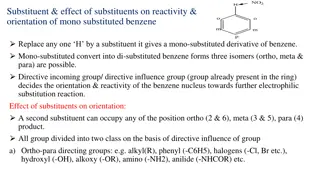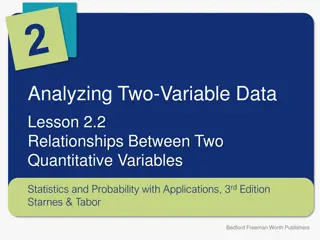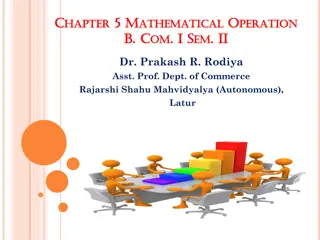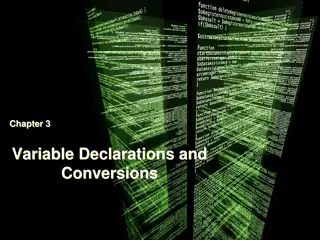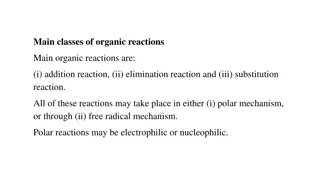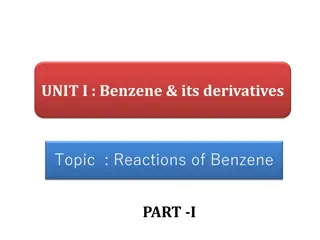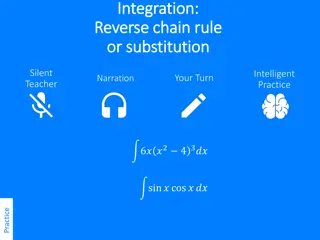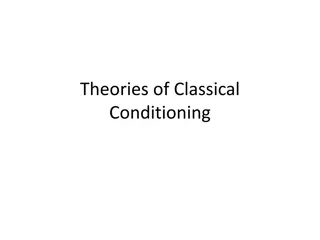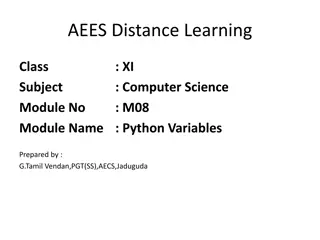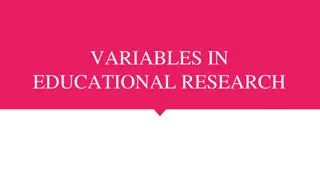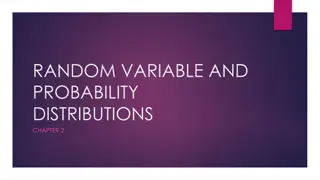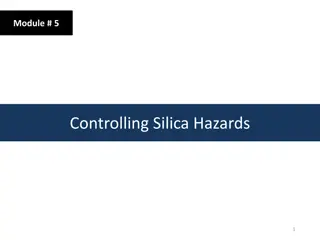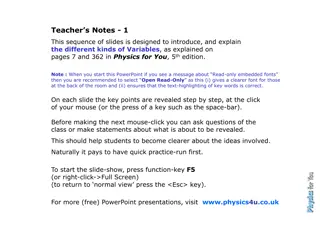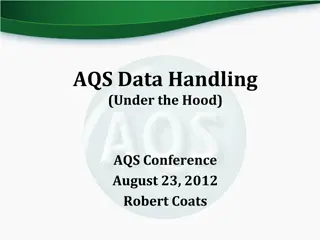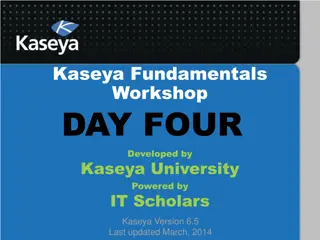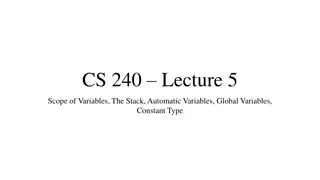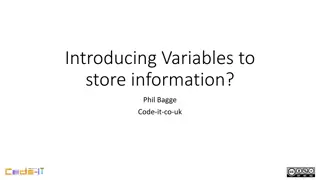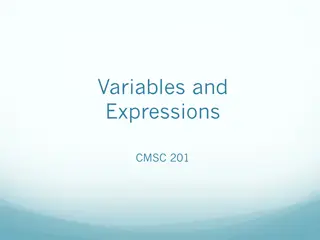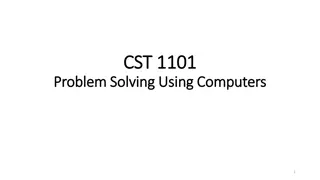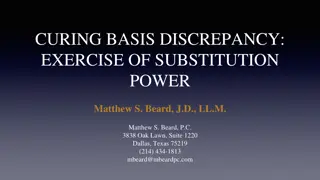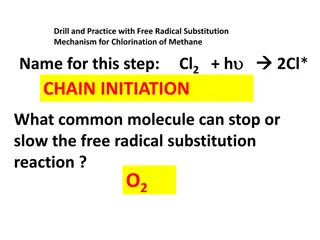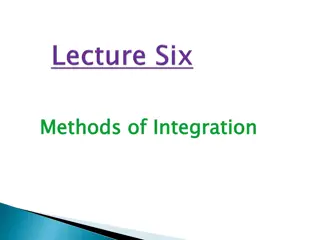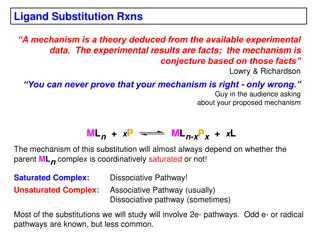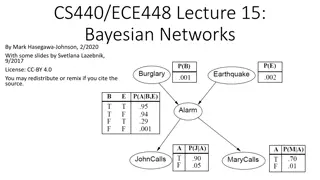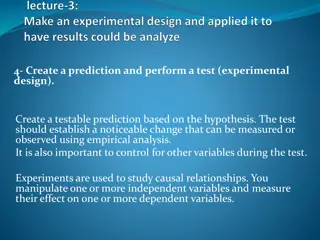Understanding Dummy Variables in Regression Analysis
Dummy variables are essential in regression analysis to quantify qualitative variables that influence the dependent variable. They represent attributes like gender, education level, or region with binary values (0 or 1). Econometricians use dummy variables as proxies for unmeasurable factors. These
3 views • 19 slides
Understanding Variables in Research Studies
Variables in research studies play crucial roles in examining relationships and drawing conclusions. They include independent variables that influence outcomes, dependent variables affected by independent ones, moderator variables that strengthen or weaken relationships, intervening variables lying
7 views • 34 slides
Module C1:Material substitution.
Explore the concept of material substitution in the context of circular economy principles for energy storage. Understand the importance of material availability, limitations of secondary raw materials in energy applications, and classification of energy conversion and supportive materials. Discover
5 views • 16 slides
Substituent Effects on Benzene Reactivity and Orientation
Substituents in benzene derivatives influence reactivity and orientation in electrophilic substitution reactions. They can be classified as ortho-para directing or meta directing based on their effect. Ortho-para directing groups increase electron density and activate the ring, while meta directing
7 views • 14 slides
Constructing and Analyzing Function Tables: CC Math 6 Expressions and Equations Unit 3
This instructional material provides resources for teachers to help students understand how to represent real-world problems using variables, write equations, analyze relationships between variables, and use graphs and tables. The content covers Common Core Standards 6.EE.9, focusing on using variab
2 views • 22 slides
Understanding Variables and Control in Research Design
In research design, variables play crucial roles as either dependent or independent factors, with extraneous variables potentially affecting study outcomes. Controlling for extraneous variables is essential to attribute effects solely to the independent variables. Research hypotheses aim to test pre
0 views • 6 slides
Exploring Nonlinear Relationships in Econometrics
Discover the complexities of nonlinear relationships through polynomials, dummy variables, and interactions between continuous variables in econometrics. Delve into cost and product curves, average and marginal cost curves, and their implications in economic analysis. Understand the application of d
2 views • 34 slides
Analyzing Two-Variable Data in Statistics and Probability
This content delves into analyzing relationships between two quantitative variables in statistics and probability, focusing on distinguishing between explanatory and response variables, creating scatterplots, and interpreting the strength and form of relationships displayed. It emphasizes the import
0 views • 14 slides
Mastering Symbol Substitution in Mathematical Operations
In the realm of mathematical operations, understanding symbol substitution is key to solving questions efficiently. Learn how to interchange mathematical signs and symbols to find the correct answer. With examples and guidance, grasp the concept of symbol substitution and excel in tackling such ques
0 views • 25 slides
Understanding Variable Declarations and Conversions in Java
Properly declaring variables in Java is essential before using them. This chapter covers different types of variable declarations, including class variables, instance variables, local variables, and parameter variables. It also explains the concept of type casting and the importance of explicitly de
1 views • 23 slides
Overview of Organic Reactions and Mechanisms
Organic reactions can be categorized into addition, elimination, and substitution reactions, occurring through either polar or free radical mechanisms. Polar reactions may be electrophilic or nucleophilic, while free radical reactions involve radicals reacting to complete electron octets. Different
2 views • 26 slides
Understanding Benzene and its Electrophilic Aromatic Substitution Reactions
Aromatic compounds like benzene undergo electrophilic aromatic substitution reactions (EAS). This process involves the reaction of an electrophile with the aromatic ring, leading to the formation of various derivatives. Examples include halogenation, nitration, and sulphonation of benzene, each with
0 views • 13 slides
Integrating Reverse Chain Rule and Substitution in Calculus
Explore the concepts of reverse chain rule and substitution in integration through worked examples and practice questions involving trigonometric functions. Enhance your skills with interactive narration and practical exercises. Dive into the world of calculus with a silent teacher guiding you throu
0 views • 5 slides
Understanding Random Variables and Their Applications in Various Fields
Random variables play a crucial role in statistics, engineering, and business applications. They can be discrete or continuous, depending on the nature of the outcomes. Discrete random variables have countable values, while continuous random variables can take on any real number. This article explor
0 views • 6 slides
Theories of Classical Conditioning: Critical Concepts and Pavlov's Stimulus Substitution Theory
Understand the key aspects of classical conditioning, including the critical CS-US relationship and Pavlov's Stimulus Substitution Theory. Explore why organisms respond predictably, uncover criticisms and flaws in the theory, and delve into the bigger problem of selecting for certain conditioned res
0 views • 75 slides
Python Variables: Understanding Declaration, Naming Rules, and Assignment Operators
Python variables are essential for storing values in reserved memory locations. This article covers the basics of variables in Python, including declaration, assigning values, naming rules, multiple assignments, deleting variables, and assignment operators. Learn how to create, name, and manipulate
0 views • 11 slides
Understanding Variables in Educational Research
Variables in educational research play a crucial role as symbols of events, traits, or characteristics that can be measured and categorized. Different types of variables such as change, effect, and outcome variables are essential in studying causal relationships. Dependent variables represent outcom
6 views • 17 slides
Understanding Random Variables and Probability Distributions
Random variables are variables whose values are unknown and can be discrete or continuous. Probability distributions provide the likelihood of outcomes in a random experiment. Learn how random variables are used in quantifying outcomes and differentiating from algebraic variables. Explore types of r
0 views • 13 slides
Controlling Silica Hazards: Effective Engineering Controls
Techniques for controlling silica hazards in the workplace include elimination, substitution, and engineering controls like ventilation, dust containment systems, wet methods, and housekeeping practices. Elimination involves removing silica exposure risks, while substitution replaces risky materials
1 views • 21 slides
Understanding Variables in Physics: A Comprehensive Guide
This presentation introduces and explains different types of variables in Physics, emphasizing the concepts of independent, dependent, and control variables. It provides practical examples and tips for identifying variables in experiments, aiming to enhance students' understanding of scientific meth
2 views • 24 slides
Enhancing Automation Efficiency through Substitution Variables
The University of Tennessee Health Science Center implemented automation in Financial Aid processes to reduce workload and improve efficiency. Learn how substitution variables, notifications, and PL/SQL procedures were utilized to streamline operations in this insightful session.
0 views • 35 slides
AQS Data Handling: Insights from AQS Conference August 2012
Delve into the intricacies of AQS data handling discussed at the AQS Conference in August 2012. Explore topics such as sample measurement rules, MDL substitution, rounding methods, acceptance/rejection criteria, standard value calculation, and more. Gain insights into the importance of data complete
0 views • 12 slides
Kaseya Fundamentals Workshop - Agent Procedures and Variables Overview
Discover the key aspects of Agent Procedures and Variables in Kaseya Fundamentals Workshop, including Managed Variables, Global Variables, and Public Variables. Explore examples of Agent Procedures and learn about Application Deployment, Windows Registry Modification, and more. Gain insights into Pr
0 views • 23 slides
Understanding Transition Bias and Substitution Models in Genetics
Transition bias and substitution models, explored by Xuhua Xia, delve into the concepts of transitions and transversions in genetic mutations, the causes of transition bias, the ubiquitous nature of transition bias in invertebrate and vertebrate genes, the mitochondrial genetic code, and RNA seconda
1 views • 25 slides
Understanding Memory Stack and Variable Scope in Computer Architecture
This content delves into the scope of variables, the stack in memory architecture, automatic and global variables, and the concept of constant types. It explains the functioning of the stack, how function calls are managed, and the allocation of variables within stack frames. The relationship betwee
0 views • 18 slides
Understanding Variables in Programming
Variables in programming act as containers to store information. They are essential in languages like Scratch to hold values. Computers use labels to identify variables, and values stored inside can be accessed by reading the labels. Programming utilizes commands like "var" to define variables and s
0 views • 23 slides
Introduction to Variables and Expressions in Python
Today we start Python! Learn about variables, how to create them, assign values, and perform mathematical operations using variables in Python. Understand the rules for naming variables and how they are essential for storing and managing information in your programs. Explore different types of varia
0 views • 16 slides
Understanding Variables in Programming and Memory Concepts
Variables are essential in programming as they allow temporary storage of data within a program. This content delves into the concept of variables, their importance, and how they function in memory. It explains the relationship between variable names and memory locations, discusses data types, and h
0 views • 19 slides
Understanding Variables in Economics
Variables in economics, such as dependent, independent, endogenous, and exogenous variables, play a crucial role in analyzing economic phenomena. Dependent variables are influenced by changes in other variables, while independent variables are not. Endogenous variables are internal and need to be pr
0 views • 8 slides
Understanding Substitution Power in Trusts: A Comprehensive Analysis
This document delves into the intricacies of substitution power in trust administration, discussing its significance, typical features, and implications. It covers the structure of substitutions, fiduciary duties, valuation considerations, documentation requirements, and scenarios involving refusal
0 views • 16 slides
The Art of Variables in Programming and Delicious Sandwiches
Explore the concept of variables in programming using fun analogies of creating a PBJ sandwich and a s'more. Understand how variables act as containers to store important information in code. Discover the ingredients needed for each delicious treat and learn how variables play a crucial role in both
0 views • 5 slides
Free Radical Substitution Mechanism in Methane Chlorination
Explore the detailed steps of the free radical substitution mechanism in the chlorination of methane, including chain initiation, propagation, and termination. Learn about the role of common molecules like O2 in slowing or stopping the reaction and discover how radical-radical recombination reaction
0 views • 10 slides
Raw Elements Substitution in Electronic and Optoelectronic Technologies Overview
Explore the advancements in raw elements substitution in electronic and optoelectronic technologies led by Pier Carlo Ricci from the University of Cagliari, focusing on key applications, research areas, and industry impacts. The project, coordinated by RESET, aims to enhance sustainability and innov
0 views • 12 slides
Methods of Integration and Trigonometric Substitution
Explore methods of integration including integration by parts and trigonometric substitution. Learn how to apply these techniques to solve integrals involving logarithmic, trigonometric, and rational functions. Discover step-by-step processes and identities to simplify and evaluate various types of
0 views • 7 slides
Understanding Ligand Substitution Reactions in Metal Complexes
Ligand substitution reactions in metal complexes involve the replacement of one ligand with another, impacting the coordination around the metal center. The mechanism of these reactions, associative or dissociative, is influenced by factors like coordination saturation and electron count. Experiment
0 views • 20 slides
Understanding Bayesian Networks for Efficient Probabilistic Inference
Bayesian networks, also known as graphical models, provide a compact and efficient way to represent complex joint probability distributions involving hidden variables. By depicting conditional independence relationships between random variables in a graph, Bayesian networks facilitate Bayesian infer
0 views • 33 slides
Understanding Space-for-Time Substitution in Community Ecology
Space-for-time substitution (SFT) is a method used to study slow ecological processes by assuming different sites are at various stages of development. This approach, famous for its role in ecological development, has been critiqued for its implicit use in testing hypotheses on ecological processes
0 views • 7 slides
Designing a Controlled Experiment: Steps and Considerations
Experimental design involves systematically testing hypotheses by manipulating independent variables and measuring their effects on dependent variables. This process includes considering variables, designing treatments, assigning subjects to groups, and planning measurements. To ensure valid conclus
0 views • 11 slides
COVID-19 Testing Supply Substitution Strategies Overview
This resource provides validated supply alternatives for labs conducting authorized COVID-19 tests to address availability concerns during the pandemic. It covers strategies for substitution of components in Real-time RT-PCR testing, specimen collection techniques, and acceptable swab and media choi
0 views • 22 slides
Understanding Global and Local Variables in Programming
Global and local variables play essential roles in programming. Global variables can be accessed by all functions within a program, while local variables are restricted to specific functions. This text explains the concepts with analogies and code examples to illustrate how variables are scoped in p
0 views • 8 slides



